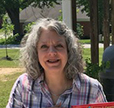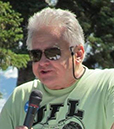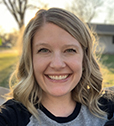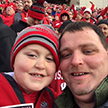In honor of National Cancer Survivors Day on Sunday, June 6, we recognize the more than 16.9 million cancer survivors in the United States. To celebrate, we're sharing seven pieces of sage advice from six of our own patients with cancer.
Our survivors:
- Ben Lamb (39), 5-year esophageal cancer survivor
- Cassie Schober (34), 6-year breast cancer survivor
- Curt Anderson (73), 9-year lung cancer survivor
- Denice Riley (59), 8-year breast cancer survivor
- Heather Ploen (59), 3-year colon cancer survivor
- John (Jack) Newton (69), in remission from esophageal cancer since January
1. Be your own advocate
After the initial shock of her breast cancer diagnosis, Riley took charge. She carried a notebook so she could write down any questions as they occurred to her and brought it with her to every appointment. She created her own readily available personal resource.
 Denice Riley, breast cancer survivor
Denice Riley, breast cancer survivor
Ploen also kept a record. "During treatment, I kept a log on my side effects and talked with the nurse advocate over the phone or with the doctor at my next appointment to come up with a plan or solution."
Lamb said, "For the first 48 hours, I thought I was given a death sentence. Then I put together a game plan and said, 'You are your greatest advocate. What do you want to accomplish?'"
2. Form your support group
Remember you aren't alone. Your family and friends want to help. So form your own support group from this ready-available team.
"The most important thing I did was to be very open about my diagnosis with everyone," said Anderson. "I wanted people to be comfortable, and I didn't want the cancer to be the elephant in the room."
 Curt Anderson, lung cancer survivor
Curt Anderson, lung cancer survivor
Schober said, "Surround yourself with close family and friends until you can get the facts and map out a treatment plan. Accept help and ask for positive thoughts and prayers. Go for walks and try to do all the things you'd normally do without a diagnosis."
And when someone offers to help, take them up on it. "You'll heal faster if someone else is cooking, sweeping the kitchen, throwing in a load of laundry," said Schober. "You'll be able to focus more on your recovery."
 Cassie Schober, breast cancer survivor
Cassie Schober, breast cancer survivor3. Stay off the Internet
The Internet can be a valuable source of information. It can also be a source of misinformation, and distinguishing between the two may be hard. Lamb recommended that you just "stay off the Internet. It's one of the worse things you can do."
 Ben Lamb, esophageal cancer survivor, and son
Ben Lamb, esophageal cancer survivor, and sonSchober agreed, "Don't Google anything." Instead talk with your cancer care team if you have questions or concerns.
4. Rely on your cancer care team, but raise questions and concerns
Anderson said, "The person who helped me the most was my lung cancer care coordinator, Jody. She was excellent. When I wondered what to do now? Jody would call me and set it up."
"Trust your medical team and do not be afraid to ask for clarification or explanations as things go along," said Ploen.
Lamb added, "Ask the questions that need to be asked. These experts are responsive, and if they don't know the answer they set you up with someone who does."
Newton, who was treated both at Cambridge Medical Center and at Abbott Northwestern Hospital, said "throughout the organization, the cancer care was incredible. Providers across the system bring each other in, collaborate in care and leverage each other's expertise, all to your benefit."
5. Tips for coping with treatment
"Keep your daily schedule as normal as possible. But be sure to listen to your body, and if you need to slow down, then slow down," said Ploen. "And take a friend to chemo treatments just to sit with you. I thought I could do it on my own and was so glad after each treatment that someone went with me."
"When I was experiencing side effects from tamoxifen, I would document everything, from the effects I was feeling to what shoes I was wearing," said Riley. "I told my oncologist everything and never once did he make me feel I was off base."
6. Embrace the people you love
Ploen recommends that when you can, focus on the people in your life. She said she focused on her daughter's and her husband's needs during that time.
"How do you tell your child?" said Ploen. "I worked with my daughter's school counselor so that they could be aware and be there for her. I asked friends to keep an eye out for my husband and take him out for a beer now and then."
Newton's cancer story is bittersweet. He was told he was in remission two days before his wife of 46 years, Mary, passed away from recurrent ovarian cancer. His advice to others is to "stop and love each other in every moment. Cherish every moment and don't let anything go under the bridge."
 John Newton, in remission from esophageal cancer, and Mary Newton
John Newton, in remission from esophageal cancer, and Mary Newton7. Look beyond your diagnosis
Riley added that you will be able to move on beyond your diagnosis. "When you get your diagnosis, it is all consuming. But you will get to a point where you don't think about cancer every single day. With time, you do forget and you'll start thinking more about life in general."



 Denice Riley, breast cancer survivor
Denice Riley, breast cancer survivor  Curt Anderson, lung cancer survivor
Curt Anderson, lung cancer survivor Cassie Schober, breast cancer survivor
Cassie Schober, breast cancer survivor Ben Lamb, esophageal cancer survivor, and son
Ben Lamb, esophageal cancer survivor, and son John Newton, in remission from esophageal cancer, and Mary Newton
John Newton, in remission from esophageal cancer, and Mary Newton


